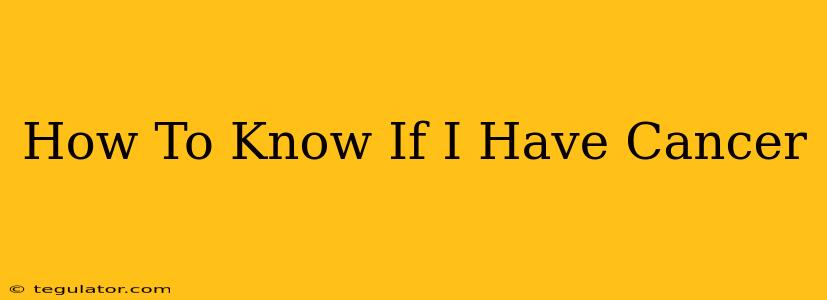Facing the possibility of cancer is understandably frightening. Knowing the potential warning signs can empower you to seek medical attention promptly, which is crucial for early diagnosis and successful treatment. This guide will explore common cancer symptoms, emphasizing that this information is not a substitute for professional medical advice. Seeing a doctor for any concerning symptoms is always the best course of action.
Understanding Cancer Symptoms: It's Not Always Obvious
Cancer manifests differently depending on its type and location in the body. Some cancers show noticeable symptoms early, while others might not present any obvious signs until they've progressed significantly. This is why regular check-ups and screenings are so important.
Common Cancer Warning Signs:
While not every symptom indicates cancer, these should prompt a visit to your doctor:
- Unexplained Weight Loss: Significant weight loss without dieting or exercise should be investigated.
- Fatigue: Persistent, overwhelming tiredness that doesn't improve with rest.
- Fever or Night Sweats: Recurring fevers or drenching night sweats, particularly without an infection.
- Skin Changes: New moles, changes in existing moles (size, shape, color), sores that don't heal, or unusual bleeding or bruising. This includes paying close attention to potential melanoma warning signs.
- Lumps or Thickening: Finding a lump or thickening in the breast, testicles, or elsewhere in the body.
- Persistent Cough or Hoarseness: A cough that doesn't go away or changes in voice quality.
- Changes in Bowel or Bladder Habits: Changes in bowel movements (constipation, diarrhea, or blood in stool) or bladder habits (frequent urination, pain during urination, or blood in urine).
- Indigestion or Difficulty Swallowing: Persistent indigestion or difficulty swallowing, which can be a sign of esophageal or stomach cancer.
- Persistent Headaches: Severe or worsening headaches, especially accompanied by other symptoms.
- Unexplained Pain: Pain that persists for weeks or months and doesn't respond to treatment.
Seeking Professional Medical Advice: The Crucial Next Step
If you experience any of these symptoms, do not delay seeking medical attention. Your doctor can conduct a thorough examination, order necessary tests (such as blood tests, imaging scans, or biopsies), and determine the cause of your symptoms. Early detection significantly improves the chances of successful cancer treatment.
Types of Cancer Screenings: Prevention is Key
Many types of cancer can be detected early through regular screenings. Discuss appropriate screenings with your doctor based on your age, family history, and risk factors. Common screenings include:
- Mammograms: For breast cancer screening.
- Pap Smears and HPV Tests: For cervical cancer screening.
- Colonoscopies: For colorectal cancer screening.
- Prostate-Specific Antigen (PSA) Test: For prostate cancer screening.
Beyond the Symptoms: Lifestyle and Risk Factors
While these symptoms can indicate cancer, many other factors contribute to cancer risk. Maintaining a healthy lifestyle can reduce your risk:
- Maintain a Healthy Diet: Focus on fruits, vegetables, and whole grains.
- Regular Exercise: Aim for at least 150 minutes of moderate-intensity aerobic activity per week.
- Avoid Tobacco: Smoking is a major risk factor for many cancers.
- Limit Alcohol Consumption: Excessive alcohol use increases cancer risk.
- Protect Yourself from Sun Exposure: Use sunscreen and limit sun exposure to reduce skin cancer risk.
Remember: Early Detection Saves Lives
This information is for general knowledge and does not constitute medical advice. If you're concerned about cancer, schedule an appointment with your doctor immediately. Early detection is crucial for successful treatment and improving your prognosis. Don't hesitate to reach out to your healthcare provider; your health is paramount.

